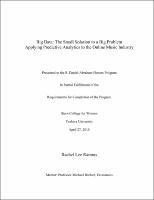Please use this identifier to cite or link to this item:
https://hdl.handle.net/20.500.12202/4193| Title: | Big Data: The Small Solution to a Big Problem Applying Predictive Analytics to the Online Music Industry |
| Authors: | Ramras, Rachel Lee |
| Keywords: | Big data --Economic aspects. Music trade --Technological innovations. Musical analysis --Data processing. Music trade --Internet marketing. Web usage mining. Music and the Internet. |
| Issue Date: | Apr-2015 |
| Publisher: | Stern College for Women |
| Abstract: | Today’s generation is constantly criticized for its obsession with and reliance upon technology. It is easy to conjure imagery of youth with their thumbs attached to the keyboards of their phones and headphones glued to their ears. However, while this disapproval stems from a rational, understandable concern, these critics fail to recognize the positive aspects brought about by these new hi-tech appendages. For thousands of years data has been a significant factor in the way cultures develop, communities function and professionals perform in the workforce. When the ancient Mesopotamians developed writing, their intention was to create a system for keeping track of information that might be useful to their culture. Governments, dating back to biblical times, have conducted censuses to collect records about their citizens, in order to make more informed decisions about how to organize their community. Actuaries, in addition to other professionals dealing with risk, have gathered data about the threats they work to avoid, in the hopes that these pools of figures will reveal innovative information that might assist them in their work. While these efforts are logical and well founded, they are not always practically executed. In the analog age, accumulating and interpreting this data was extremely costly, time-consuming and inefficient; often times the collected data was outdated by the time the study was completed. Once “digitization,” the process of converting information into a digital format, became popularized, this data amassing process changed drastically. Not only did the method for collecting data become more economical and 3 conducive to progress, but furthermore, since the data was now stored digitally, it could be saved and reused for future purposes, regardless the intent of its original collectors. (MayerSchonberg 71-90) |
| Description: | The file is restricted for YU community access only. |
| URI: | https://hdl.handle.net/20.500.12202/4193 https://ezproxy.yu.edu/login?url=https://repository.yu.edu/handle/20.500.12202/4193 |
| Appears in Collections: | S. Daniel Abraham Honors Student Theses |
Files in This Item:
| File | Description | Size | Format | |
|---|---|---|---|---|
| Rachel-Ramras.pdf Restricted Access | 226.6 kB | Adobe PDF |  View/Open |
This item is licensed under a Creative Commons License

